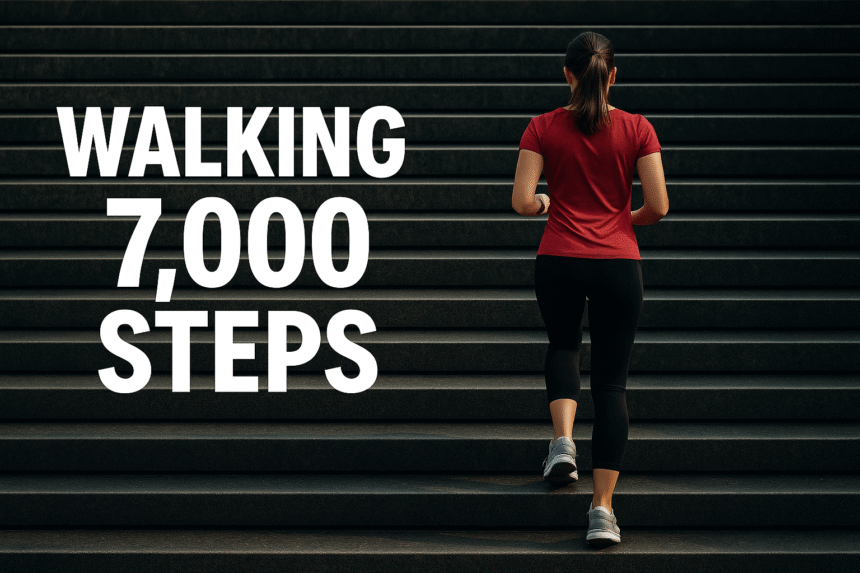Here is the full blog article written in an informative, entertaining, and witty style, using “walking 7000 steps” as the focus keyword:
🥿 “7,000 Reasons to Walk: Why Walking 7000 Steps Is Your New Superpower”
Keyword: walking 7000 steps
Let’s face it—we all love shortcuts. From fast food to fast charging, we want results now. But what if I told you there’s a shortcut to a healthier, longer, and happier life… and all it requires is a pair of shoes and 7000 steps a day?
Yes, you heard that right. According to a recent study published in The Lancet Public Health Journal, walking 7000 steps daily can significantly reduce your risk of heart disease, type-2 diabetes, and even cancer. That’s right—no pills, no protein shakes, no pricey gym memberships. Just walking.
So lace up and read on. Let’s break this down, one step at a time.
🚶♂️ The 7k Magic Number: Why Not 10,000?
We’ve grown up with this mystical figure—10,000 steps a day. It’s been the fitness gospel for years. But here’s the twist: It turns out walking 7000 steps might be more realistic and just as effective, especially for people who aren’t marathon-ready.
The study analyzed data from over 160,000 adults. It found that 7000 steps daily is enough to:
- Lower the risk of cardiovascular disease by 25%
- Slash the chance of type-2 diabetes by 14%
- Cut depression risk by 22%
- Drop the chances of dying early by up to 47%
Now, that’s a life extension hack no tech billionaire can beat.
💡 The Science of Stepping
The study didn’t stop at just counting footsteps. It dived deep. Even 4000 steps a day showed notable improvements in health compared to the couch potato lifestyle (you know who you are).
For diseases like dementia and depression, the sweet spot climbed a little higher, but 7000 was the magic number where benefits seemed to plateau—meaning, more steps don’t always mean more benefits.
So if you were pushing yourself to hit 12,000 or even 20,000 steps, maybe relax a little. Your joints—and your timeline—will thank you.
🧠 Walking Is the New Therapy
Here’s where the magic deepens. Walking isn’t just good for your heart; it’s a workout for your brain. The study revealed:
- Dementia risk reduced by 38%
- Falls among older adults decreased by 28%
- Depression rates slashed by 22%
Forget retail therapy. Walking 7000 steps might just be the best mood-lifter you didn’t know you needed.
And guess what? Walking is free, side-effect-free, and no prescription needed.
⏱ Time Crunch? Break It Down
We get it. Life is busy. Between work, doom-scrolling, Netflix, and maybe a social life, who has time?
But here’s the trick: 7000 steps isn’t a sprint. It’s a collection.
- Walk 10 minutes after every meal.
- Take that call while walking.
- Park a little farther.
- Ditch the elevator for stairs.
Boom! You’re at 7000 before you know it. No sweat. (Well, maybe a little.)
👟 Step Up Your Routine—Literally
Here are a few witty, real-world tips to reach your step goals without turning your life upside down:
- The Loop Trick: Add an extra loop around your building when you go out.
- Water Walks: Drink more water so you walk to the loo more often. Win-win.
- Dog or Borrow One: Dogs are natural walking buddies and great step motivators.
- Dance Like No One’s Watching: Because it counts. And it’s fun.
- Walk and Talk: Ditch the chairs during calls.
Remember, walking 7000 steps a day isn’t about competition. It’s about consistency.
🛑 But Wait—Isn’t 7000 Too Little?
Well, for elite athletes? Maybe.
But for the 9-to-5 warriors, exhausted parents, retired legends, and everyone in between, 7000 steps a day is powerful. Especially when your current average is closer to 2000.
The study authors even emphasized that 7000 steps may be more realistic than 10,000, particularly for people who are just starting out or managing chronic conditions.
Translation: Some steps are always better than no steps.
🔍 The Flip Side—Any Catch?
As with any study, the researchers added a gentle disclaimer: While the benefits are obvious, some of the results—especially for diseases like cancer or dementia—need more supporting studies.
Translation: We’re still learning, but there’s already a mountain of evidence saying walking 7000 steps works wonders.
In short: don’t wait for 100% certainty to start walking. Your body and brain already approve.
🌍 From Fitness Fad to Lifestyle Flex
You don’t need fancy gear. Or an expensive smartwatch. Or Lycra. All you need is awareness and a pair of shoes.
Whether it’s in your living room, your society lane, a local park, or a walking treadmill—steps are steps. They don’t care where you take them, only that you do.
So why is walking 7000 steps becoming a movement in itself?
- It’s inclusive
- It’s doable
- It’s effective
- And most importantly, it’s habit-forming
Form a walking group. Take a step challenge. Or just become the lone wolf walker at 7 AM. Whatever your style, own it.
🎯 Final Step: Make It Count
Let’s ditch the idea that exercise has to be exhausting, dramatic, or expensive. Sometimes, the answer has been right under our feet all along.
Walking 7000 steps a day isn’t a gimmick. It’s backed by data. It’s kind to your knees. And it might just be the smartest investment in your health portfolio.
So, instead of adding a new gym membership to your to-do list, add this:
✅ Walk 7000 steps.
✅ Stay alive longer.
✅ Feel awesome.
Now go, take that first step.












